Читать книгу The Forgiveness Solution - Philip H. Friedman - Страница 29
На сайте Литреса книга снята с продажи.
Heartland Forgiveness Scale Scoring and Interpretation
ОглавлениеThere is a square or circle next to each of the blanks where you have written your responses to each item. You will now write a score for each item in the circle or square that is next to that response.
Score the Items with Squares Next to Them: For each item with a square next to it (items 1, 3, 5, 8, 10, 12, 14, 16, and 18), your score is the same as the number that you wrote. To score each of these items, simply write the same number for your score that you already wrote for your response. For example, if you wrote the number 6, your score would be 6, and you would write the number 6 in the square next to your response for that item.
Score the Items with Circles Next to Them: For each item with a circle next to it (items 2, 4, 6, 7, 9, 11, 13, 15, and 17), the scores are not the same as the number you wrote. For these items, the scores are “reversed” (e.g., a response of 1 is scored as 7 and a response of 7 is scored as 1). Use the list of scores given below to write the correct score next to the number that you wrote in response to each of these items. For example, if you wrote the number 6, your score would be 2, and you would write the number 2 in the circle next to your response for that item.
Calculate and Interpret Your HFS Subscale Scores and HFS Total Scale Score
FORGIVENESS OF SELF SUBSCALE
Calculate Your Score: Add together your scores for items 1 to 6. The result is your Forgiveness of Self score. _____ __
Interpret Your Score: Your score on the Forgiveness of Self subscale indicates how forgiving you tend to be of yourself, with higher scores indicating higher levels of forgiveness, and lower scores indicating lower levels of forgiveness.
A score of 6 to 17 means that you are usually unforgiving of yourself.
A score of 18 to 29 means that you are sometimes forgiving and sometimes unforgiving of yourself. That is, you are about as likely to forgive yourself as you are not to forgive yourself.
A score of 30 to 42 means that you are usually forgiving of yourself.
FORGIVENESS OF OTHERS SUBSCALE
Calculate Your Score: Add together your scores for items 7 to 12. The result is your Forgiveness of Others score._____
Interpret Your Score: Your score on the Forgiveness of Others subscale indicates how forgiving you tend to be of other people, with higher scores indicating higher levels of forgiveness, and lower scores indicating lower levels of forgiveness.
A score of 6 to 17 means that you are usually unforgiving of other people.
A score of 18 to 29 means that you are sometimes forgiving and sometimes unforgiving of others. That is, you are about as likely to forgive others as you are not to forgive others.
A score of 30 to 42 means that you are usually forgiving of other people.
FORGIVENESS OF SITUATIONS SUBSCALE
Calculate Your Score: Add together your scores for items 13 to 18. The result is your Forgiveness of Situations subscale score._____
Interpret Your Score: Your score on the Forgiveness of Situations subscale indicates how forgiving you tend to be of negative circumstances, events, or situations that are beyond anyone's control (such as an illness or a natural disaster). Higher scores indicate higher levels of forgiveness, and lower scores indicate lower levels of forgiveness.
A score of 6 to 17 means that you are usually unforgiving of uncontrollable situations.
A score of 18 to 29 means that you are sometimes forgiving and sometimes unforgiving of uncontrollable situations. That is, you are about as likely to forgive uncontrollable situations as you are not to forgive uncontrollable situations.
A score of 30 to 42 means that you are usually forgiving of uncontrollable situations.
TOTAL HEARTLAND FORGIVENESS SCALE
Calculate Your Score: Add together your three scores for the Forgiveness of Self, Forgiveness of Others, and Forgiveness of Situations subscales (or add together your scores for items 1 to 18). The result is your Total Forgiveness scale score._____
Interpret Your Score: Your score on the Total Heartland Forgiveness scale indicates how forgiving you tend to be of yourself, other people, and uncontrollable situations. Higher scores indicate higher levels of forgiveness, and lower scores indicate lower levels of forgiveness.
A score of 18 to 53 means that you are usually unforgiving of yourself, others, and uncontrollable situations.
A score of 54 to 89 means that you are sometimes forgiving and sometimes unforgiving of yourself, others, and uncontrollable situations. That is, you are about as likely to forgive as you are not to forgive.
A score of 90 to 126 means that you are usually forgiving of yourself, others, and uncontrollable situations.
You can write your subscale and total scale scores in the boxes below.
